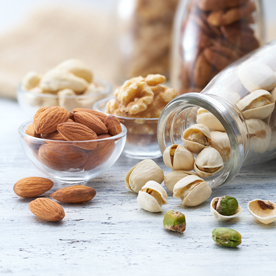
Managing a cocktail of hormones can feel like enough to deal with when you have PCOS. But the added burden of PMS can make your emotions even more pronounced. Sadly, there’s no magic bullet to completely alleviate PMS. However, you can support the reduction of symptoms with the correct approach – in particular, using supplementation. Here, we outline the best natural aids for managing PMS with PCOS.
Natural supplements for PMS
Premenstrual syndrome (PMS) encapsulates the symptoms many women experience in the weeks before their periodi. Almost every woman will have PMS at some point in their lifetime. PMS can manifest both emotionally and physicallyii.
Emotional and behavioural symptoms:
-
Mood swings
-
Anxiety
-
Fatigue
-
Depression
-
Irritability, aggression or anger
-
Clumsiness
-
Difficulty sleeping
-
Forgetfulness
-
Reduced self-confidence
Physical symptoms
-
Tender breasts
-
Feeling bloated
-
Headaches
-
Food cravings
-
Constipation or diarrhoea
-
Backache
-
Hot flushes or cold sweats
-
General ache and pains
-
Acne
Magnesium

Though little-heralded, magnesium may be one of the most important health-promoting minerals. As well as supporting insulin sensitivity – a common characteristic of PCOS – magnesium may soothe PMS-related stomach cramps.
In one study, 250mg of magnesium was given to a group of female participants aged 18-45 over a 3-month period. The findings revealed magnesium helped to diminish many of the physical symptoms caused by PMS, like cravings, insomnia and bloatingiii.
In another study, magnesium demonstrated promise in supporting the emotional implications of PMS, such as improving mild anxiety and reducing fatigueiv.
You can obtain magnesium from a range of foods including spinach, Swiss chard, dark chocolate, cashews, almonds and Brazil nuts. To properly safeguard against a deficiency and bolster the body’s natural reserves, however, we recommend adding a high-strength, easily absorbed, quality magnesium supplement to your diet.
Vitamin B6
As you may know, PMS can lead to mood disturbances, including anxiety, low mood, and irritability. Crucially, vitamin B6 is involved in the production of serotonin, the body’s ‘feel-good’ hormone, which supports mood and floods the brain with joy, positivity and overall wellbeing.
A controlled trial highlighted taking 50-100mg of vitamin B6 each day may reduce depressive symptoms triggered by PMSv. This study further concluded that women who supplemented their vitamin B6 intake with magnesium reported a greater reduction in their emotional PMS symptoms than simply taking magnesium alone.
Rich food sources of vitamin B6 include organic meat, potatoes, starchy vegetables, non-citrus fruits and chickpeas. If you struggle to meet your requirements through food alone, we suggest taking 100mg per day in supplement form.
Learn more about the benefits of vitamin B6 and PCOS here.
Think zinc
Zinc also plays a key role in regulating your menstrual cycle. Some experts believe taking zinc daily may decrease anxiety, depression – often symptomatic of PMS – and improve the overall quality of life, too.
Interestingly, levels of zinc are noticeably lower in women exhibiting PMS symptoms than those who don’t. Studies have shown that supplementing zinc in the latter 2 weeks of your menstrual cycle could be enormously beneficial for PMSvi.
We recommend taking 15mg of zinc daily to help ease PMS symptoms. While red meat, oysters, shellfish, pumpkin seeds, and cashews are all excellent, natural sources of zinc, a quality supplement is a great insurance policy.
Myo-inositol
Food cravings are a natural part of PMS. One explanation for this is the changes in your hormone levels require more calories. Research now suggests myo-inositol may stabilise insulin levels, thereby controlling your cravingsvii.
Besides this, myo-inositol is also purported to reduce anxiety, which is often characteristic of PMSviii. Indeed, inositol supports the production of serotonin in the brain – an important ‘feel-good’ neurotransmitter that impacts mood and behaviour. Research suggests it may help to reduce the number of panic attacks in those with panic disordersix.
The most prevalent sources of myo-inositol are unprocessed whole grains, citrus fruits, dried prunes and brewer’s yeast. However, you would have to eat huge quantities to get your daily dose. The simpler and more convenient option is to take 2 to 4 grams of myo-inositol in powdered form each day.
Calcium
Research indicates that calcium levels tend to be lower in those experiencing PMS, which may contribute to headaches, low mood, sleep issues, appetite changes, and joint painx. But one study highlighted that supplementing with 100mg to 120mg may support the reduction of these symptomsxi.
It’s also worth noting that low levels of magnesium are associated with poor calcium levels. That’s why it’s essential to increase your intake of both minerals to reinforce your natural reserves. Learn more about the benefits of calcium for PCOS women here.
You may think boosting your milk and yoghurt intake is the solution here. But it’s not the case. These foods have a high glycaemic index (the rate at which your body breaks down carbs for energy) and will cause a spike in your insulin and androgen levels, potentially exacerbating other PCOS symptoms, like weight gain and acne.
You can meet your calcium requirements by adding more leafy greens, salmon, tofu and nuts to your diet. To ensure you meet the Nutrient Reference Value (NRV) of 100mg, we recommend taking a high-strength, quality calcium supplement.
Final thoughts…
For many women, PMS can be hugely debilitating. And while most will experience their fair share of moods swings, headaches and stomach cramps, PCOS can make this monthly affair even more challenging and painful. Unfortunately, there are no quick fixes. But by increasing your consumption of the nutrients outlined above, you can certainly help to manage some of the symptoms.
Did you find this article useful? Browse the rest of our hub to learn even more ways to live happily and healthily with PCOS.
References:
-
PMS (premenstrual syndrome). (2020). https://www.nhs.uk/conditions/pre-menstrual-syndrome
-
Premenstrual syndrome, Health Information. Bupa UK.(2020). https://www.bupa.co.uk/health-information/womens-health/pre-menstrual-syndrome
-
Boyle, N.N., Lawton, C., Dye, L. (2016). The Effects of Magnesium Supplementation on Subjective Anxiety and Stress-A Systematic Review. Nutrients. 9(5).
-
Quaranta, S., Buscaglia, M.A., Meroni, M.G., Colombo, E., Cella, C. (2007). Pilot study of the efficacy and safety of a modified-release magnesium 250 mg tablet (Sincromag) for the treatment of premenstrual syndrome. Clin Drug Investig. 27(1): 51-8.
-
Fathizadeh, N., Ebrahimi, E., Valiani, M., Tavakoli, N., Yar, M.H. (2010). Evaluating the effect of magnesium and magnesium plus vitamin B6 supplement on the severity of premenstrual syndrome. F Iran J Nurs Midwifery Res. 15(1): 401-5.
-
Fathizadeh, N., Amani, R., Haghighizadeh, M.H., Hormozi, R. (2015). Comparison of serum zinc concentrations and body antioxidant status between young women with premenstrual syndrome and normal controls: A case-control study. International Journal of Reproductive Biomedicine. 14(11): 699-704.
-
Pintaudi, B., Di Vieste, G., Bonomo, M. (2016). The Effectiveness of Myo-Inositol and D-Chiro Inositol Treatment in Type 2 Diabetes. Int J Endocrinol.
-
Carlomagno, G., et al. (2011). Myo-inositol in the treatment of premenstrual dysphoric disorder. Human Psychopharmacology: Clinical And Experimental. 26(7), 526-530.
-
Palatnik, A., et al. (2001). Double-Blind, Controlled, Crossover Trial of Inositol Versus Fluvoxamine for the Treatment of Panic Disorder. Journal Of Clinical Psychopharmacology. 21(3), 335-339.
-
Shamberger, R.J. (2003). Calcium, magnesium, and other elements in the red blood cells and hair of normals and patients with premenstrual syndrome. Biol Trace Elem Res. 94:123–129.
-
Akhlaghi, F., Hamedi, A., Javadi, Z., Hosseinipoor, F., et al. (2004). Effects of calcium supplementation on premenstrual syndrome. Razi Journal of Medical Sciences. 10:669-675.
Related Posts?
Disclaimer: The information presented by Nature's Best is for informational purposes only. It is based on scientific studies (human, animal, or in vitro), clinical experience, or traditional usage as cited in each article. The results reported may not necessarily occur in all individuals. Self-treatment is not recommended for life-threatening conditions that require medical treatment under a doctor's care. For many of the conditions discussed, treatment with prescription or over the counter medication is also available. Consult your doctor, practitioner, and/or pharmacist for any health problem and before using any supplements or before making any changes in prescribed medications.

Olivia
Olivia Salter has always been an avid health nut. After graduating from the University of Bristol, she began working for a nutritional consultancy where she discovered her passion for all things wellness-related. There, she executed much of the company’s content marketing strategy and found her niche in health writing, publishing articles in Women’s Health, Mind Body Green, Thrive and Psychologies.
View More



